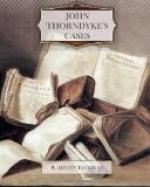The District Railway carried us swiftly eastward, and we emerged from Aldgate Station a full half-hour before we were due. Nevertheless, Thorndyke stepped out briskly, but instead of making directly for the mortuary, he strayed off unaccountably into Mansell Street, scanning the numbers of the houses as he went. A row of old houses, picturesque but grimy, on our right seemed specially to attract him, and he slowed down as we approached them.
“There is a quaint survival, Jervis,” he remarked, pointing to a crudely painted, wooden effigy of an Indian standing on a bracket at the door of a small old-fashioned tobacconist’s shop. We halted to look at the little image, and at that moment the side door opened, and a woman came out on to the doorstop, where she stood gazing up and down the street.
Thorndyke immediately crossed the pavement, and addressed her, apparently with some question, for I heard her answer presently: “A quarter-past six is his time, sir, and he is generally punctual to the minute.”
“Thank you,” said Thorndyke; “I’ll bear that in mind;” and, lifting his hat, he walked on briskly, turning presently up a side-street which brought us out into Aldgate. It was now but five minutes to four, so we strode off quickly to keep our tryst at the mortuary; but although we arrived at the gate as the hour was striking, when we entered the building we found Dr. Davidson hanging up his apron and preparing to depart.
“Sorry I couldn’t wait for you,” he said, with no great show of sincerity, “but a post-mortem is a mere farce in a case like this; you have seen all that there was to see. However, there is the body; Hart hasn’t closed it up yet.”
With this and a curt “good-afternoon” he departed.
“I must apologize for Dr. Davidson, sir,” said Hart, looking up with a vexed face from the desk at which he was writing out his notes.
“You needn’t,” said Thorndyke; “you didn’t supply him with manners; and don’t let me disturb you. I only want to verify one or two points.”
Accepting the hint, Hart and I remained at the desk, while Thorndyke, removing his hat, advanced to the long slate table, and bent over its burden of pitiful tragedy. For some time he remained motionless, running his eye gravely over the corpse, in search, no doubt, of bruises and indications of a struggle. Then he stooped and narrowly examined the wound, especially at its commencement and end. Suddenly he drew nearer, peering intently as if something had attracted his attention, and having taken out his lens, fetched a small sponge, with which he dried an exposed process of the spine. Holding his lens before the dried spot, he again scrutinized it closely, and then, with a scalpel and forceps, detached some object, which he carefully washed, and then once more examined through his lens as it lay in the palm of his hand. Finally, as I expected, he brought forth his “collecting-box,” took from it a seed-envelope, into which he dropped the object—evidently something quite small—closed up the envelope, wrote on the outside of it, and replaced it in the box.




